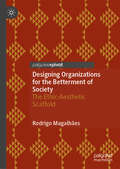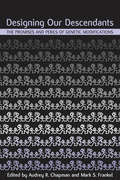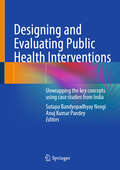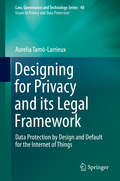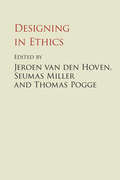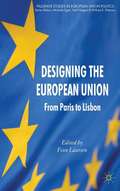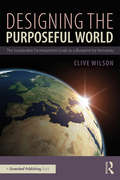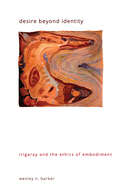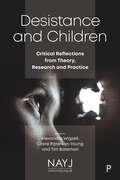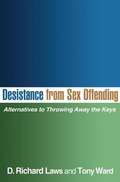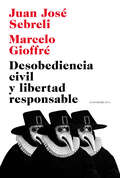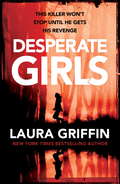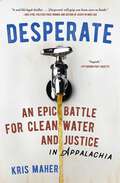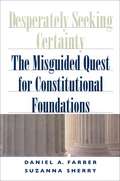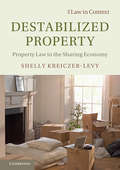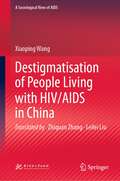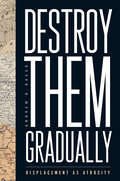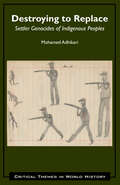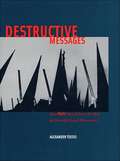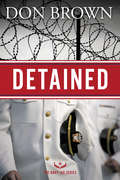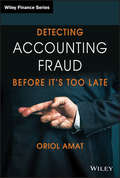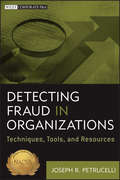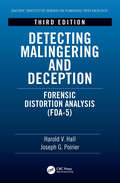- Table View
- List View
Designing Organizations for the Betterment of Society: The Ethic-Aesthetic Scaffold
by Rodrigo MagalhãesThere is an urgent need for the repositioning of organization design in today’s fast-moving technological, social and political environments. Building on the theory of human-centred design as a new foundation of the study of organization, this book offers a detailed model and approach that brings organization design to a new era of ethical and aesthetic concerns for the role of organizations in society. A new managerial role is put forward, the organization designer, as a unique set of responsibilities aimed at ensuring that the principles and values behind the organization’s purpose are not only upheld, but also permeate the entirety of the organization. The book contains a number of concepts that offer a unique contribution to the management literature and which can be applied in practice, perhaps as part of the organization’s regular staff development programs. It will be of great interest to academics and students of organization studies, business ethics, sustainability and strategic management.
Designing Our Descendants: The Promises and Perils of Genetic Modifications (Bioethics)
by Audrey R. Chapman Mark S. FrankelThe Human Genome Project, discoveries in molecular biology, and new reproductive technologies have advanced our understanding of how genetic science may be used to treat persons with genetic disorders. Greater knowledge may also make possible genetic interventions to "enhance" normal human characteristics, such as height, hair or eye color, strength, or memory, as well as the transmittal of such modifications to future generations. The prospect of inheritable genetic modifications, or IGMs, whether for therapeutic or enhancement purposes, raises complex scientific, ethical, and regulatory issues. Designing Our Descendants presents twenty essays by physicians, scientists, philosophers, theologians, lawyers, and policy analysts addressing these issues from diverse perspectives. In three sections, the authors discuss the short- and long-term scientific feasibility of IGM technology; ethical and religious issues related to safety, justice, morality, reproductive rights, and enhancement; and regulatory issues including the necessity of public input and oversight and the influence of commercialization. Their goal is to open a dialogue engaging not only scholars and scientists but also government officials and concerned citizens. The authors conclude that while IGM cannot be carried out safely and responsibly on humans utilizing current methods, it is important to begin public discussion now to determine whether, and if so how, to proceed.
Designing and Evaluating Public Health Interventions: Unwrapping the key concepts using case studies from India
by Sutapa Bandyopadhyay Neogi Anuj Kumar PandeyThis book covers all aspects of public health interventions, emphasizing the design, implementation, and evaluation of such initiatives. Section I provides information ranging from fundamental concepts of designing an intervention to its implementation and scalability. Section II highlights evidence around interventions to address pressing public health concerns through interesting case studies from India, that offer practical insights for better understanding. This book is relevant for researchers and academicians in public health, epidemiology, health management and economics, health policy, and allied branches. It equips readers to design and analyze interventions to improve practice.
Designing for Privacy and its Legal Framework
by Aurelia Tamò-LarrieuxThis book discusses the implementation of privacy by design in Europe, a principle that has been codified within the European Data Protection Regulation (GDPR). While privacy by design inspires hope for future privacy-sensitive designs, it also introduces the need for a common understanding of the legal and technical concepts of privacy and data protection. By pursuing an interdisciplinary approach and comparing the problem definitions and objectives of both disciplines, this book bridges the gap between the legal and technical fields in order to enhance the regulatory and academic discourse. The research presented reveals the scope of legal principles and technical tools for privacy protection, and shows that the concept of privacy by design goes beyond the principle of the GDPR. The book presents an analysis of how current regulations delegate the implementation of technical privacy and data protection measures to developers and describes how policy design must evolve in order to implement privacy by design and default principles.
Designing in Ethics
by Seumas Miller Thomas Pogge Jeroen Van Den HovenMany of our interactions in the twenty-first century - both good and bad - take place by means of institutions, technology, and artefacts. We inhabit a world of implements, instruments, devices, systems, gadgets, and infrastructures. Technology is not only something that we make, but is also something that in many ways makes us. The discipline of ethics must take this constitutive feature of institutions and technology into account; thus, ethics must in turn be embedded in our institutions and technology. The contributors to this book argue that the methodology of 'designing in ethics' - addressing and resolving the issues raised by technology through the use of appropriate technological design - is the way to achieve this integration. They apply their original methodology to a wide range of institutions and technologies, using case studies from the fields of healthcare, media and security. Their volume will be important for philosophical practitioners and theorists alike.
Designing the European Union
by Finn LaursenThis book has chapters on all the treaties establishing the European Communities in the 1950s as well as subsequent treaties reforming these community treaties (Merger Treaty, Budget Treaties, and the Single European Act) followed by chapters on the Maastricht Treaty establishing the European Union in 1993 and subsequent amendments thereof through the Amsterdam, Nice and Lisbon treaties. The authors are all established and well-known scholars of European integration. The book thus traces the 'constitutional' foundation of the European Union (EU) over time and analyses these development from a comparative perspective: who were the main actors, what were their preferences and which institutions did they design to deal with common problems and challenges? Despite the rejection of the proposed Constitutional Treaty in referendums in France and the Netherlands in 2005 the 'constitutionalization' of the EU has continued. The book tries to answer both the 'how' and 'why' questions of this fascinating process.
Designing the Purposeful World: The Sustainable Development Goals as a Blueprint for Humanity
by Clive WilsonIn September 2015, at the United Nations, world leaders agreed on seventeen Sustainable Development Goals or SDGs. This book extrapolates the SDGs into the idea of a purposeful world. In this context, the purpose for humanity is to thrive sustainably alongside other life forms and to consciously celebrate the process. The SDGs serve as a powerful vision, time-stamped at the 2030 time horizon, not just for world leaders but for us all. However, faced with the challenges of implementing the SDGs, we (including business leaders, government leaders and anyone wishing to make a difference) can feel overwhelmed. Wilson takes the reader on a journey of thought and invites them to work out their personal role in sustainability as well as their collaborative role alongside others in their communities and organisations. Written in a very accessible style, the book celebrates some of the many achievements made by ordinary people as a catalyst for hope, sets out a number of achievable goals and provides exercises to enable the reader to adopt practices that help to make a difference. It is the perfect book to help turn the SDGs into action at every level – governmental, organisational and personal.
Desire and Human Flourishing: Perspectives from Positive Psychology, Moral Education and Virtue Ethics (Positive Education)
by Magdalena BoschThis book discusses the concept of desire as a positive factor in human growth and flourishing. All human decision-making is preceded by some kind of desire, and we act upon desires by either rejecting or following them. It argues that our views on and expressions of desire in various facets of life and through time have differed according to how human beings are taught to desire. Therefore, the concept has tremendous potential to affect human beings positively and to enable personal growth. Though excellent research has been done on the concepts of flourishing, character education and positive psychology, no other work has linked the concept of desire to all of these topics. Featuring key references, explanations of central concepts, and significant practical applications of desire to various fields of human thought and action, the book will be of interest to students and researchers in the fields of positive psychology, positive education, moral philosophy, and virtue ethics.
Desire beyond Identity: Irigaray and the Ethics of Embodiment (SUNY series in Gender Theory)
by Wesley N. BarkerCritically adapts the notion of desire in Luce Irigaray's philosophy to rethink the role of embodiment in sociopolitical and philosophical discourses today.Arguing for a radical return to desire in Luce Irigaray's thought, this book decisively intervenes in impasses around questions of identity that continue to confound contemporary discourse and politics. By prioritizing the disruptive potential of desire rather than sexual difference, Wesley N. Barker extends Irigaray's relational theory of becoming into new territory, opening generative, often surprising pathways for conversation with philosophies of race, queer theory, political theology, decolonial theory, and posthuman thought. As a source for reimagining materiality, desire is pulled free of a phallocentric, white, colonial framework and mobilized toward a philosophy of living capable of addressing the twenty-first century's multifaceted crises of identity, representation, and embodiment.
Desistance and Children: Critical Reflections from Theory, Research and Practice
by Colin Falconer John Wainwright Julie Shaw Martin Stephenson Claire Fitzpatrick Neal Hazel Stephen Case Samantha Burns Jo Staines Kathy Hampson Gilly Sharpe Steve Carr Kirstine Szifris Diana Johns Kevin R Haines Ross Little Katie Hunter Tim Rosier Sean Creaney Andrew Brierley Anne-Marie Douglas Roberta Evans Neema Trivedi-BatemanAvailable open access digitally under CC BY-NC-ND licence. ‘Desistance’ - understanding how people move away from offending – has become a significant policy focus in recent years, with desistance thinking transplanted from the adult to the youth justice system in England and Wales. This book is the first to critique this approach to justice-involved children, many of whom are yet to fully develop an identity (criminal or otherwise) from which to ‘desist’. Featuring voices from academia, policy and practice, this book explores practical approaches to desistance with children in the ‘Child First’ context. It gives new insights into how children can be supported to move away from offending and proposes reforms to make a meaningful difference to children’s lives.
Desistance from Sex Offending
by D. Richard Laws Tony WardThis book offers a fresh perspective on treating a population that is often demonized by policymakers, the public, and even clinicians. The authors argue that most sex offenders are "people like us," with the potential to lead meaningful, law-abiding lives if given a chance and appropriate support. They describe an empirically and theoretically grounded rehabilitation approach, the Good Lives Model, which can be integrated with the assessment and intervention approaches that clinicians already use. Drawing on the latest knowledge about factors promoting desistance from crime, the book discusses how encouraging naturally occurring desistance processes, and directly addressing barriers to community reintegration, can make treatment more effective and long lasting.
Desobediencia civil y libertad responsable
by Juan José Sebreli Marcelo GioffréReflexión erudita, testimonio urgente y alegato políticamente poderoso de Sebreli que, al cumplir noventa años, en plena pandemia del Covid-19, habiéndose contagiado y recuperado, rescata el concepto clásico de desobediencia civil y lo propone como modo de resistencia responsable a los atropellos a la libertad y de defensa de la democracia. 28 de mayo de 2020: en el marco de una entrevista televisiva, Juan José Sebreli introduce la idea de desobediencia civil, concepto clásico de la filosofía política del siglo XIX, como posible respuesta a la cuarentena impuesta por el gobierno de cara a la pandemia del Covid-19. En la serie de reacciones heterogéneas que desencadenó esa mención debe buscarse el origen de estas páginas. La falsa antinomia entre salud y economía es solo una de las muchas formas en que se enmascara una creciente vocación autoritaria que es necesario enfrentar. Este libro postula una tesis tan audaz como indispensable: que el atropello a las libertades individuales habilita a los ciudadanos a un tipo de resistencia a la ley que, ejercida de modo responsable, público y no violento, lejos de debilitar las instituciones las enriquece y estabiliza. Ensayo filosófica e historiográficamente erudito, testimonio reflexivo y urgente, y alegato necesariamente político -por esas razones poderoso y valiente artefacto en defensa de la democracia-, Desobediencia civil y libertad responsable se publica en ocasión del nonagésimo cumpleaños de Sebreli.
Desperate Girls: A nail-biting thriller filled with shocking twists
by Laura GriffinOne of Publishers Weekly Best Books of 2018!'Desperate Girls is a nail-biting read from the very first page to the final, shocking twist. I could not put this book down' Melinda Leigh'Griffin pulls out all the stops in a phenomenal twist ending that will leave readers stunned' Publishers WeeklyFrom New York Times bestselling author Laura Griffin comes a tightly wound, fast-paced romantic thriller that follows a desperate woman on the run as she hides from a killer's symbolic revenge spree. Perfect for fans of Karen Rose, Alexandra Ivy and Kendra Elliot.Defense attorney Brynn Holloran is right at home among cops, criminals, and tough-as-nails prosecutors. With her sharp wit and pointed words, she's a force to be reckoned with in the courtroom, but in her personal life, she's a mess.When a vicious murderer she once helped prosecute resurfaces and starts a killing spree to wipe out those who put him behind bars, one thing becomes clear: Brynn needs to run for her life.Turning to a private security firm for protection, Brynn can't resist getting involved in the investigation. As the clock ticks down on a manhunt, Brynn's desperate search for the truth unearths long-buried secrets and reignites a killer's cold fury.
Desperate: An Epic Battle for Clean Water and Justice in Appalachia
by Kris MaherSet in Appalachian coal country, this &“superb&” (Pittsburgh Post-Gazette) legal drama follows one determined lawyer as he faces a coal industry giant in a seven-year battle over clean drinking water for a West Virginia community.For two decades, the water in the taps and wells of Mingo County didn&’t look, smell, or taste right. Could the water be the root of the health problems—from kidney stones to cancer—in this Appalachian community? Environmental lawyer Kevin Thompson certainly thought so. For seven years, Thompson waged an epic legal battle against Massey Energy, West Virginia&’s most powerful coal company, helmed by CEO Don Blankenship. While Massey&’s lawyers worked out of a gray glass office tower in Charleston known as &“the Death Star,&” Thompson set up shop in a ramshackle hotel in the fading coal town of Williamson. Working with fellow lawyers and a crew of young activists, Thompson would eventually uncover the ruthless shortcuts that put the community&’s drinking water at risk. Retired coal miners, women whose families had lived in the area&’s coal camps for generations, a respected preacher and his brother, all put their trust in Thompson when they had nowhere else to turn. Desperate is a masterful work of investigative reporting about greed and denial, &“both a case study in exploitation of the little guy and a playbook for confronting it&” (Kirkus Reviews). Maher crafts a revealing portrait of a town besieged by hardship and heartbreak, and an inspiring account of one tenacious environmental lawyer&’s mission to expose the truth and demand justice.
Desperately Seeking Certainty: The Misguided Quest for Constitutional Foundations
by Daniel A. Farber Suzanna SherryIrreverent, provocative, and engaging, Desperately Seeking Certainty attacks the current legal vogue for grand unified theories of constitutional interpretation. On both the Right and the Left, prominent legal scholars are attempting to build all of constitutional law from a single foundational idea. Dan Farber and Suzanna Sherry find that in the end no single, all-encompassing theory can successfully guide judges or provide definitive or even sensible answers to every constitutional question. Their book brilliantly reveals how problematic foundationalism is and shows how the pragmatic, multifaceted common law methods already used by the Court provide a far better means of reaching sound decisions and controlling judicial discretion than do any of the grand theories.
Destabilized Property: Property Law in the Sharing Economy (Law in Context)
by Shelly Kreiczer-LevyThe sharing economy challenges contemporary property law. Does the rise of access render our conception of property obsolete? What are the normative and theoretical implications of choosing casual short-term use of property over stable use? What are the relational and social complications of blurring the line between personal and commercial use of property? The book develops a novel conceptualization of property in the age of the sharing economy. It argues that the sharing economy pushes for a mobile and flexible vision of engaging with possessions and, as a result, with other people. Property's role as a source of permanence and a facilitator of stable, long-term relationships is gradually decreasing in importance. The book offers a broad theoretical and normative framework for understanding the changing landscape of property, provides an institutional analysis of the phenomenon, discusses the social, communal, and relational implications of these changes, and offers guidelines for law reform.
Destigmatisation of People Living with HIV/AIDS in China (A Sociological View of AIDS)
by Xiaoping WangAfter reviewing related theories on stigmatisation of people living with HIV/AIDS (PLWHA), this book applies social exclusion theory, actor theory and stigma theory to the study of social mechanisms of stigmatisation of PLWHA in China to show the influence and mechanism of stigmatisation on them, and tries to construct the policy framework to tackle stigmatisation from the perspective of welfare pluralism. Qualitative analysis was used and data was obtained during the field interview. Thirty PLWHA and seventeen healthy people (non-infected people and staff of ASO Service Organizations) were selected by using random sampling and snowball sampling for semi-structured depth interviews. The research examines the treatments and living conditions of those PLWHA, aiming to explore the influence of HIV on them in education, employment, medical care, economy, welfare and social relations. The book is intended for graduate students, researchers interested in this field and relevant policymakers.
Destroy Them Gradually: Displacement as Atrocity (Genocide, Political Violence, Human Rights)
by Andrew R. BassoPerpetrators of mass atrocities have used displacement to transport victims to killing sites or extermination camps to transfer victims to sites of forced labor and attrition, to ethnically homogenize regions by moving victims out of their homes and lands, and to destroy populations by depriving them of vital daily needs. Displacement has been treated as a corollary practice to crimes committed, not a central aspect of their perpetration. Destroying Them Gradually examines four cases that illuminate why perpetrators have destroyed populations using displacement policies: Germany’s genocide of the Herero (1904–1908); Ottoman genocides of Christian minorities (1914–1925); expulsions of Germans from East/Central Europe (1943–1952); and climate violence (twenty-first century). Because displacement has been typically framed as a secondary aspect of mass atrocities, existing scholarship overlooks how perpetrators use it as a means of executing destruction rather than a vehicle for moving people to a specific location to commit atrocities.
Destroying to Replace: Settler Genocides of Indigenous Peoples (Critical Themes in World History)
by Mohamed Adhikari"This book explores settler colonial genocides in a global perspective and over the long durée. It does so systematically and compellingly, as it investigates how settler colonial expansion at times created conditions for genocidal violence, and the ways in which genocide was at times perpetrated on settler colonial frontiers. This volume will prove invaluable to teachers and students of imperialism, colonialism, and human rights."—Lorenzo Veracini, Swinburne University of Technology, and author of The World Turned Inside Out: Settler Colonialism as a Political Idea
Destructive Messages: How Hate Speech Paves the Way For Harmful Social Movements (Critical America #27)
by Alexander TsesisDestructive Messages argues that hate speech is dangerous not only when it poses an immediate threat of harm. It is also dangerous when it is systematically developed over time, becoming part of a culturally acceptable dialogue which can foster the persecution of minorities.Tsesis traces a causal link between racist and biased rhetoric and injustices like genocide and slavery. He shows that hate speech and propaganda, when left unregulated, can weave animosity into the social fabric to such a great extent that it can cultivate an environment supportive of the commission of hate crimes. Tsesis uses historical examples to illuminate the central role racist speech played in encouraging attitudes that led to human rights violations against German Jews, Native Americans, and African Americans, and also discusses the dangers posed by hate speech spread on the Internet today. He also offers an examination of the psychology of scapegoating.Destructive Messages argues that when hate speech is systematically developed over time it poses an even greater threat than when it creates an immediate clear and present danger. Tsesis offers concrete suggestions concerning how to reform current law in order to protect the rights of all citizens.
Detained
by Don BrownA man and his son dreamed of America’s freedom, but the dream became a nightmare when they ended up at Guantanamo Bay. Hasan Makari and his son Najib, both Lebanese nationals, have dreamed of the day they would experience the shining freedom of America. But when they arrive in the US, they are arrested, accused of terrorism, and incarcerated at the Guantanamo Bay prison camp in Cuba, all on false charges. Suddenly, they face the nightmare of death by execution. Their only hope is Navy JAG Officer Matt Davis, who has been assigned to the case of his life—to defend the Makaris in court at Guantanamo Bay. Matt believes his clients are innocent but faces monumental opposition—not only from powerful federal prosecutors with a huge agenda and an unlimited budget, but also from the woman he loves who, as a fellow JAG officer, has been ordered onto the prosecution team to convict the Makaris. As the drama unfolds in Cuba, Emily Gardner, a top-ranking TSA lawyer, has just received a larger-than-life nomination as General Counsel for the Department of Homeland Security. While preparing for confirmation by the US Senate, she discovers a shocking scheme that will turn her life upside down. Can Emily expose the truth in time to save the lives of those being accused—and escape with her own life? Somewhere between the war-torn plains of Northern Lebanon and the secret torture chamber of Guantanamo Bay lie the keys to justice.
Detecting Accounting Fraud Before It's Too Late (The Wiley Finance Series)
by Oriol AmatDetect accounting fraud before it’s too late Accounting fraud is the deliberate manipulation of accounting records in order to make a company's financial performance seem better or worse than it actually is. Accounting scandals often have catastrophic consequences for shareholders and employees. Thus, analysts and auditors must be equipped to detect accounting fraud. This book is a comprehensive guide to detecting accounting fraud for auditors investigating accounting fraud and analysts/managers seeking to prevent it. A wide variety of warning signs are described, as are several techniques for detecting and addressing fraud. Understand the motivations and warning signs behind accounting fraud Get to know how accounting fraud is done and how to detect it Avoid the losses that often come from accounting fraud Benefit from case studies throughout to that help illustrate the author's points It’s unfortunate that managers, auditors, and analysts must be wary of accounting fraud—but this book equips you with the know-how to detect it before it’s too late.
Detecting Accounting Fraud Before It's Too Late (The Wiley Finance Series)
by Oriol AmatDetect accounting fraud before it’s too late Accounting fraud is the deliberate manipulation of accounting records in order to make a company's financial performance seem better or worse than it actually is. Accounting scandals often have catastrophic consequences for shareholders and employees. Thus, analysts and auditors must be equipped to detect accounting fraud. This book is a comprehensive guide to detecting accounting fraud for auditors investigating accounting fraud and analysts/managers seeking to prevent it. A wide variety of warning signs are described, as are several techniques for detecting and addressing fraud. Understand the motivations and warning signs behind accounting fraud Get to know how accounting fraud is done and how to detect it Avoid the losses that often come from accounting fraud Benefit from case studies throughout to that help illustrate the author's points It’s unfortunate that managers, auditors, and analysts must be wary of accounting fraud—but this book equips you with the know-how to detect it before it’s too late.
Detecting Fraud in Organizations: Techniques, Tools, and Resources (Wiley Corporate F&A #644)
by Joseph PetrucelliA savvy examination of where people and value meet, creating the opportunity for fraudAn essential reference for all business professionals, Detecting Fraud in Organizations: Techniques, Tools, and Resources explains the process of how people commit fraud, as well as how to prevent and stop fraud from occurring in your organization. Organized by business processes which succinctly describe how fraud manifests itself on a daily basis, the authors explain ways in which everyone can help guard against fraud by familiarizing themselves with its building blocks and methods used to perpetrate and conceal it. Filled with situational examples the book is accompanied by a website featuring fraud simulations, business process maps, and other useful tools for combating fraud.Focuses on the people who perpetrate fraud and those who are tasked with preventing and detecting itUniquely organized by business processes for more relevance and easier understanding by those people working within organizationsShows how subtle factors play a large role in identifying and ferreting out fraud in addition to the traditional knowledge of fraud schemes giving people and organizations the edge they need to be successful in prevention and deterrenceCompanion website includes additional fraud simulations, business process maps, and useful toolsThe price of fraud can be devastating to your business. Detecting Fraud in Organizations: Techniques, Tools, and Resources equips you and others in your organization with essential information and tools necessary to proactively catch fraud, reduce losses, improve efficiencies and develop actionable controls.
Detecting Malingering and Deception: Forensic Distortion Analysis (FDA-5) (Pacific Institute Series on Forensic Psychology)
by Harold V. Hall Joseph PoirierDetecting Malingering and Deception: Forensic Distortion Analysis (FDA-5), Third Edition maintains the tradition of the prior two editions, following the Forensic Distortion Analysis (FDA) model. Fully updated since the last edition nearly 20 years ago, the book continues to serve as comprehensive volume on deception and distortion in forensic, clinical and several specialized contexts. As with the previous editions, the book presents a model of deception intended to be utilized and applied by the qualified evaluator. The proposed model covers targets of the faker, response styles show, and methods to detect the deception. The goal is to summarize the historical and latest information on distortion detection, to present guidelines for detecting deception that include variable accuracy rates based on different detection techniques, and to stimulate further research of effective methods of deception detection. Recommendations and guidelines for the practicing clinician are offered throughout the book, including real-world cases to inform and enlighten, particularly in unique cases or those in which the certain outcomes are unexpected. Key Features: Outlines the role of the forensic professional in applying and integrating methods assessment in deception and distortion Provides base-rates for deception-related behavior and events, especially useful in report writing or courtroom testimony as an expert witness Presents the latest advances in methodology and technology to assist in the search for ground truth in applied settings and situations Applies forensic distortion analysis to evaluate the deception-related findings and statements of other professionals involved in a particular case New coverage includes sections and chapters on deception analysis for collectivities, including media groups, contemporary politics, cross-national corporations, conflict, and terrorism Detecting Malingering and Deception incorporates the latest research, providing practical application to utilize information and evaluative methods as they pertain to deception-related settings and situations. Sample reports and extensive graphs, tables, charts, and histograms are provided, and every chapter has been updated with new studies and investigations. The Third Edition boasts six new chapters of coverage to expand the exploration of deception addressing advances in the field, and our current understanding of the phenomenon.
